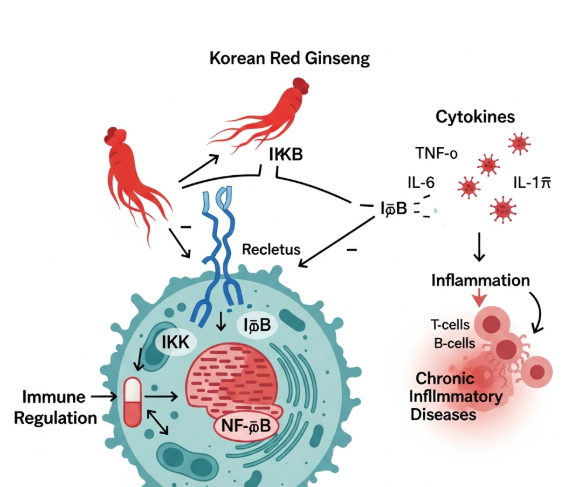Chronic inflammation is the underlying driver of most modern diseases — including arthritis, heart disease, autoimmune disorders, neurodegeneration, metabolic syndrome, and even cancer. While conventional treatments often focus on suppressing symptoms, herbal medicine research is increasingly focused on identifying immunomodulators — compounds that restore balance rather than just suppress inflammation.
Korean Red Ginseng (Panax ginseng Meyer) is one of the most extensively studied medicinal plants with potent anti-inflammatory and immune-regulating effects. Unlike drugs that simply block inflammation, red ginseng interacts with molecular pathways, immune cells, and cytokines to regulate inflammation at the root.
This article summarizes the mechanisms, clinical relevance, and scientific evidence behind red ginseng for inflammation-based diseases.
🔥 Chronic Inflammation = Silent Physiological Breakdown
Low-grade persistent inflammation is strongly linked to diseases such as:
- Rheumatoid arthritis
- Osteoarthritis
- Psoriasis
- Hashimoto’s / Autoimmune thyroid disease
- Inflammatory bowel disease (IBD, Crohn’s, UC)
- Asthma and chronic bronchitis
- Atherosclerosis
- Neuroinflammation (Alzheimer’s, Parkinson’s)
Rather than being a single condition, chronic inflammation is a state where the immune system stays activated even when there’s no infection — damaging healthy tissue over time.
🧬 Anti-Inflammatory Mechanisms of Korean Red Ginseng
1. ⚙️ Inhibits NF-κB Activation
NF-κB is the master switch of inflammation, responsible for turning on genes that produce inflammatory cytokines.
Red ginseng reduces NF-κB signaling, disrupting the cycle of chronic inflammation at the source.
2. 🧪 Reduces Pro-Inflammatory Cytokines
Clinical and lab studies show that red ginseng reduces levels of:
- TNF-α
- IL-1β
- IL-6
- COX-2
- iNOS
These cytokines drive arthritis, autoimmune disorders, and chronic pain.
3. 🌿 Immunomodulation Instead of Immune Suppression
Unlike steroids and NSAIDs, red ginseng modulates the immune system — enhancing weak responses and suppressing excessive ones.
It supports:
✔ T-regulatory cells
✔ Natural killer cell function
✔ Balanced Th1/Th2 activity
✔ Reduced autoimmune reactivity
This makes it a promising therapeutic support for autoimmune disease management.
4. 🧪 Antioxidant Defense & DNA Protection
Chronic inflammation produces oxidative stress, which damages DNA and mitochondria.
Ginseng increases endogenous antioxidant enzymes such as:
- Superoxide dismutase (SOD)
- Glutathione
- Catalase
This protects tissues from inflammation-related aging and degeneration.
5. 💥 Inhibits Inflammatory Enzymes
Red ginseng suppresses expression of:
- COX-2
- PLA2
- iNOS
These enzymes produce inflammatory mediators like prostaglandins and nitric oxide, which contribute to pain and tissue breakdown.
📊 Research Highlights
🦴 Arthritis
Human and animal studies show reduced joint swelling, pain, and inflammatory markers. Ginsenosides inhibit cartilage breakdown and cytokine activity.
💨 Asthma & Respiratory Inflammation
Red ginseng reduces airway inflammation and oxidative damage, and improves immune control of lung tissue.
🤰 Autoimmune Conditions
Some models show improved antibody response and reduced autoimmune attack, making it potentially beneficial as supportive care, not a standalone treatment.
🧠 Neuroinflammation
Promising results in Alzheimer’s models where ginseng reduces beta-amyloid-induced inflammation and improves cognitive function.
🧠 Why Red Ginseng Is Different From Turmeric or NSAIDs
| RED GINSENG | TURMERIC | NSAIDs |
|---|---|---|
| Modulates immune system | Anti-inflammatory | Blocks inflammation only |
| Improves immune balance | Antioxidant | Can cause gut and organ damage |
| Supports hormones & energy | Limited absorption | Does not improve immunity |
| Supports stress resilience (adaptogen) | Not adaptogenic | Not immune supportive |
⚠️ Precautions
❗ Consult a doctor if using immunosuppressants
❗ May interact with blood thinners
❗ Start low and increase gradually in autoimmune conditions
👑 Final Verdict
Korean Red Ginseng is not just an energy booster — it is a clinical-grade anti-inflammatory and immune-modulating herb backed by decades of mechanistic and clinical research.
It is a powerful adjunct for:
✔ Chronic inflammation
✔ Joint & autoimmune disorders
✔ Immune dysregulation
✔ Inflammation-based aging
✔ Respiratory disease
✔ Oxidative stress-driven degenerative conditions
Not a cure — but a highly promising signal-correcting adaptogen for long-term wellness and disease prevention.







